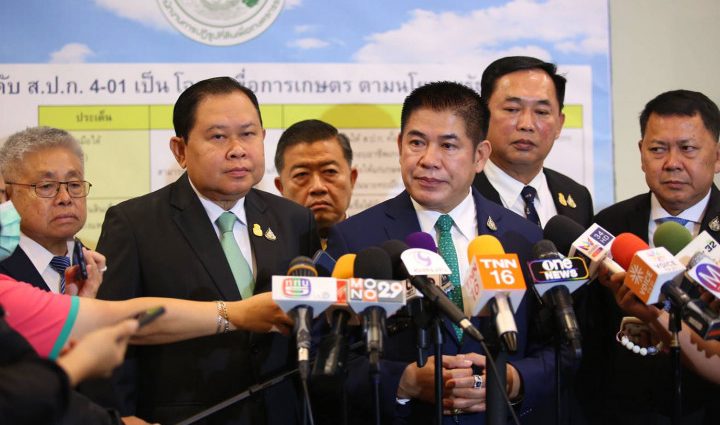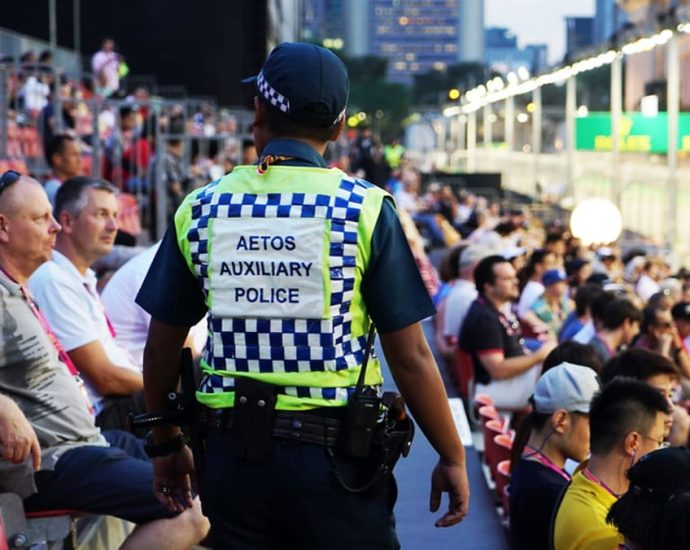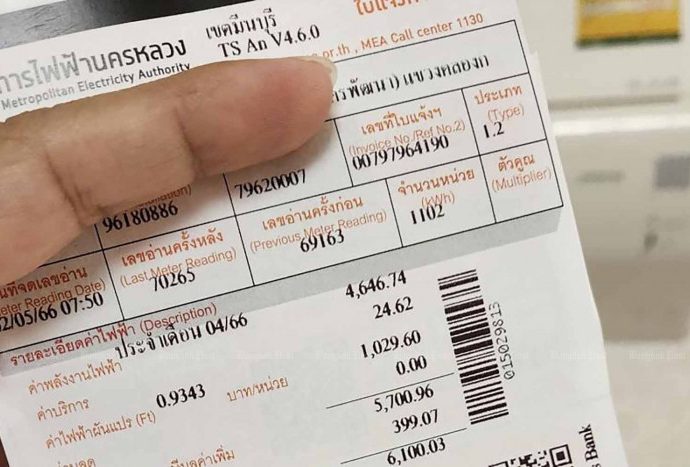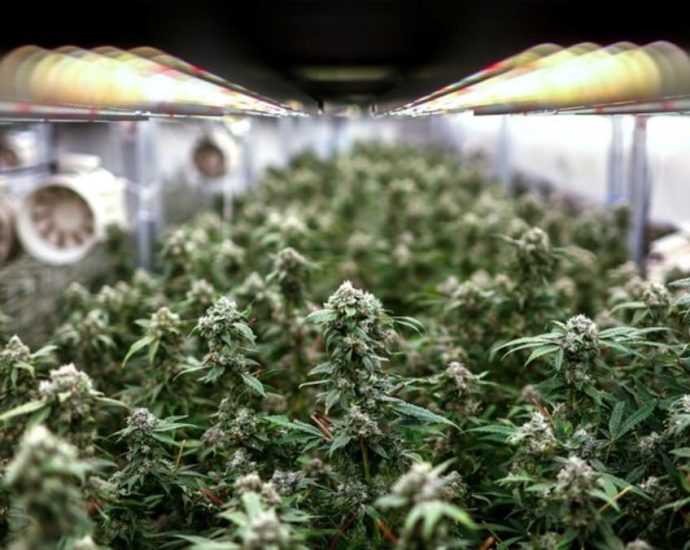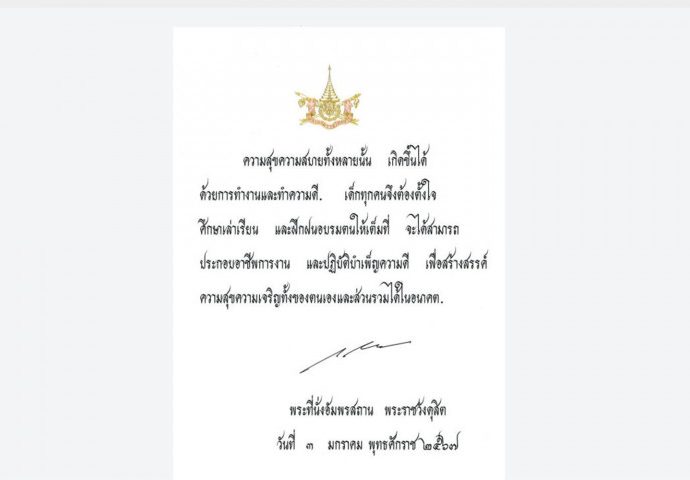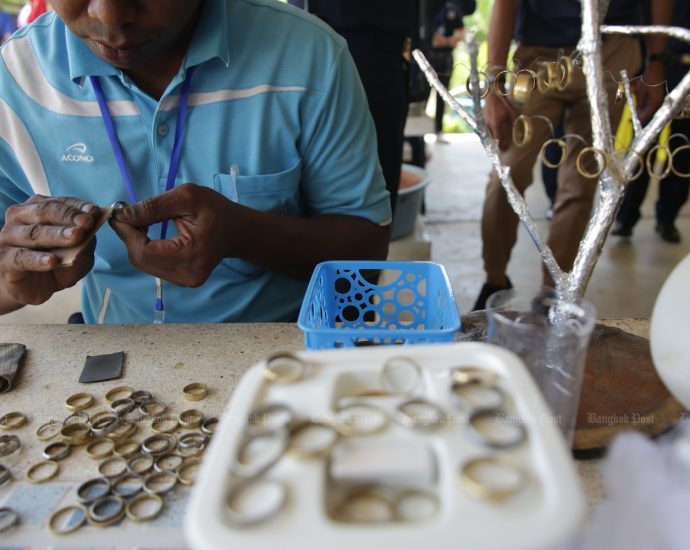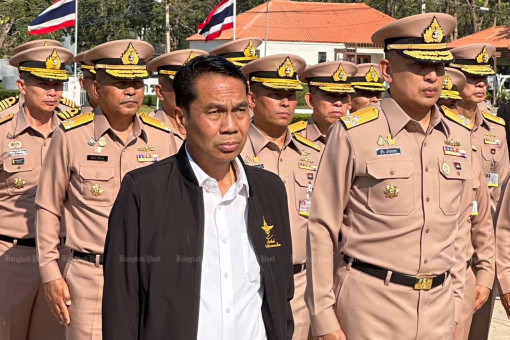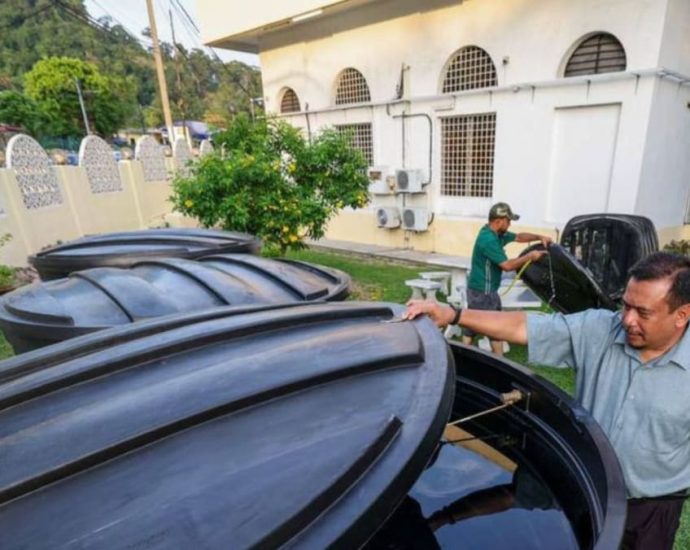Land rights upgrade to cover 22 million rai
Agriculture minister insists land reform for farmers will be free of loopholes that nominees could exploit
PUBLISHED : 10 Jan 2024 at 20:00

Over 22 million rai covered by Sor Por Kor 4-01 documents, widely known as land rights for the poor, will be upgraded to land title deeds for agriculture within five years, according to Agriculture Minister Thamanat Prompow.
He said the policy would provide the maximum benefits for eligible people, and insisted that there would be no loopholes for nominees to take advantage of.
Prime Minister Srettha Thavisin will kick off the programme by presenting land rights documents to 1,000 holders in Bang Sai district of Ayutthaya on Jan 15.
The ministry hopes to convert the status of 22 million rai of land under its responsibility within five years. The process could go faster if it had a bigger budget, Capt Thamanat said.
Documents for 2 million rai are now ready to be upgraded based on specific conditions, including that the land must have been in the holder’s possession for five years or more.
He said the ministry has come up with extra measures to prevent the illegal possession of land, and that wrongdoers will face criminal charges.
“We are focussing on the screening procedure to prevent the transfer of land to non-eligible people,” he said.
The minister has been a strong advocate of proper title for agricultural land, saying current regulations under the land reform law were out of date and not in line with societal changes.
If people no longer want to farm, he said, they should still have the option to benefitting from the land, including the right to sell it.
The ministry has established three regulations to support the policy, which would grant people the right to sell the land to other farmers or others conducting farming-related businesses.
Capt Thamanat said that more than 200,000 people have registered for the land title upgrade and that the Agricultural Land Reform Office branches in each province are ready to support them.
Some 22 million rai of Sor Por Kor land is now occupied by 1.6 million families.
Sor Por Kor 4-01 papers were introduced in 1975 to give poor landless farmers plots, mostly on degraded forest land, for small-scale farming. The land cannot be sold and can only be transferred to the children or heirs of the holders.
But over the years, many plots have changed hands illegally with the land used for commercial purposes including resorts. In 1995, then-agriculture minister Suthep Thaugsuban was accused of overseeing the granting of Sor Por Kor land to wealthy and connected people in Phuket. The resulting scandal brought down the Democrat Party government of Chuan Leekpai.
Philippine economics in a rebalancing world
Philippine aspirations to hit upper-middle-income country status were derailed by the Covid-19 pandemic, but economic planners remain optimistic that this target can be achieved by 2025.
If a new era of global political and economic rebalancing is taking place, there are clear internal challenges and international economic opportunities for the Philippines to navigate.
The Philippine economy grew by 5.7% in 2023. The International Monetary Fund recently reported that the Philippine economy had rebounded strongly from the Covid-19 pandemic despite disrupted supply chains, inflation pressures and dampened tourism revenues.
The country’s debt-to-GDP ratio jumped from about 40% prior to the pandemic to over 60% in its aftermath due to a combination of debt-driven pandemic recovery responses and severe economic contraction. But credit rating agencies and investors continue to affirm the country’s overall macroeconomic fundamentals.
Long-term forecasters remain bullish on the Philippines with its geographically critical location and young population. If these forecasts carry through, the Philippines will become a US$1 trillion economy by around 2033. Despite these predictions, the Philippines continues to struggle with inequality, persistent poverty and human development deficits.
Approved by Philippine President Ferdinand Marcos Jr in early 2023, the Philippine Development Plan 2023–2028 aims to reduce poverty to single digits by the end of the Marcos administration but hinges on producing enough high-quality jobs.
Without structural reforms that can move more Filipinos into higher productivity sectors, this has proved elusive. A nationwide survey conducted in September 2023 found that about half of Filipinos, or roughly 13.2 million families, considered themselves poor – an increase from the 12.5 million families who rated themselves poor in June 2023.
This figure is also much higher than the official 2021 poverty estimate of 18.1%, or roughly 3.5 million families.

There are also severe geographical imbalances in development and poverty reduction. While self-reported poverty reached as high as 70% in Mindanao, official poverty figures note that about one-third of farmers and fishers live in poverty.
These are stark reminders of how disconnected many Filipinos are from the hyped development prospects often reflected in macroeconomic assessments.
Out-of-pocket costs for healthcare remain a major impediment to access for low-income Filipinos. The Covid-19 pandemic exposed deep and lingering governance challenges in the health sector, with a very slow and uneven vaccine rollout and a lingering shortage of healthcare workers.
On the education front, the recently released 2022 Program for International Student Assessment results underscore how far Filipino children are behind students in other nations.
Of the 81 participating countries, the Philippines ranked sixth from the bottom in mathematics and reading and third from the bottom in science. Another study revealed that nine out of ten Filipino children aged ten were unable to read simple text.
Creating enough high-quality jobs remains a major challenge for the Philippines, which continues to lag behind other ASEAN economies in attracting job-creating foreign direct investment.
The Philippines’ 2022 foreign direct investment reached about $9.4 billion – still lower than Thailand’s $10.2 billion, Malaysia’s $15 billion, Vietnam’s $17.9 billion and Indonesia’s $21.4 billion.
On this front, the Philippines hopes to benefit from the rebalancing of global value chains driven in part by geopolitical tensions between the United States and China.
A “first of its kind” US trade and investment mission is set to visit Manila in early 2024 to begin talks on a wide range of investment areas ranging from green metals to semiconductors and renewable energy.
The Philippines’ recent foreign policy pivot to ramping up longstanding defense alliances – notably with the United States and Japan – can be leveraged to take advantage of recent friendshoring of manufacturing in Asia.
Promoting more inclusive and sustainable growth depends on reforms in education, health, food security, social protection and job creation.
The recent passage of laws to institutionalize and strengthen social protection, universal healthcare and to provide free tertiary education aims to boost human capital investments in one of the youngest countries in Asia.
Under the banner of “Build Better More,” the infrastructure investment program of the Marcos administration continues to finance roads, bridges, airports, seaports and other key infrastructure in the countryside alongside a larger push for digitalization.
Concerns over leakages in the infrastructure purse have been raised by local leaders and academics, who argue that this risks watering down the impact of these investments. Similar concerns have been raised about the Maharlika Investment Fund, a sovereign wealth fund signed into law in July 2023.
Transparency International’s 2023 corruption report ranked the Philippines 116th out of 180 countries, showing little improvement from its 2021 ranking. A Pulse Asia survey commissioned by international think tank Stratbase ADR Institute revealed that 84% of Filipinos believe that the Marcos administration needs to pursue stronger anti-corruption efforts.
But there are early positive signals. The US Millennium Challenge Corporation approved the development of threshold programs for the Philippines in December 2023 in recognition of its renewed commitment to advancing reforms in good governance, human rights and anti-corruption.
This signals a re-engagement with the Millennium Challenge Corporation after ties were severed by the Philippine government in 2017 in light of concerns over human rights violations during its anti-drug campaign.
Reformists in the Marcos administration are also pushing for changes involving extensive digitalization of the bureaucracy, which will promote greater efficiency and good governance.

Recent and anticipated legislation – like the Tatak Pinoy bill pushing for a more sophisticated industrial policy – is expected to contribute to the dynamism and inclusiveness of the Philippines’ industrial push in the post-pandemic world.
Yet the crux will be in policy execution and good governance. President Marcos will need to ramp up technocracy and temper political accommodation to make inroads here.
President Marcos has also ordered a study on the possible need for constitutional amendments, with a focus on loosening the constitution’s economic provisions to attract more foreign direct investment.
While touching the constitution has always generated controversy, it remains to be seen whether bolder steps like this can help take full advantage of the present global economic rebalancing.
Ronald U Mendoza, PhD is Senior Economist at the Ateneo Policy Centre, Ateneo de Manila University and former dean of the Ateneo School of Government from 2016 to 2022.
This article was originally published by East Asia Forum and is republished under a Creative Commons license.
Singapore still hiring auxiliary police officers from Taiwan, may recruit from more jurisdictions
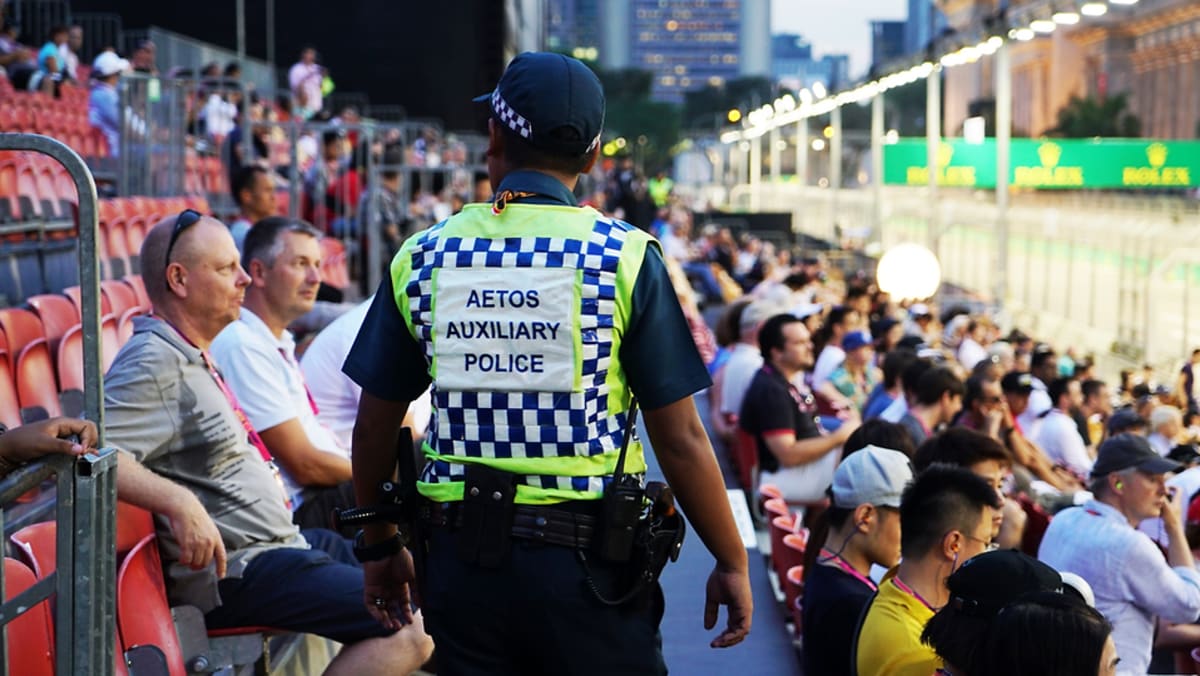
SINGAPORE: Singapore’s auxiliary police forces are still hiring officers from Taiwan, but numbers have dropped significantly since the practice began in 2017, said Home and Law Affairs Minister K Shanmugam on Wednesday (Jan 10).
As a result, the Home Affairs Ministry has been considering expanding the jurisdictions where auxiliary police officers (APOs) can be recruited from. These potentially include Asian ones such as China, India, the Philippines and Myanmar.
Mr Shanmugam revealed this in a written parliamentary response to MP Sylvia Lim (WP-Aljunied), who had asked if the hiring of APOs from Taiwan is still going on and what work challenges have surfaced among such officers.
Some private security firms, namely Certis Cisco and AETOS, first turned to recruiting APOs from Taiwan due to a shortage of local manpower, having only hired Singaporeans and Malaysians in the past.
At the time, Mr Shanmugam also pointed to a growing demand for APOs due to heightened security threats and new infrastructure, such as Changi Airport Terminal 4.
As of November last year, Singaporeans made up about 68 per cent of the total population of APOs, with the remaining 32 per cent being Malaysian and Taiwanese.
Mr Shanmugam said on Wednesday: “We need to allow the auxiliary police forces to recruit foreign APOs to meet the increasing demand for security services.
“They face challenges in sustaining an adequate pool of APOs, given the shrinking local workforce, requirements such as physical fitness, and the job options Singaporeans have.”
He noted that while the hiring of Taiwanese APOs has been “generally positive”, it has been a “challenge to recruit and keep them”.
The number of such officers has decreased by more than 60 per cent since 2017, to about 70 today.
Mr Shanmugam said this was due to the demanding nature of public-facing security work, improved job opportunities and prospects in Taiwan, a desire to settle down with a family, and homesickness.
In light of that, the Ministry of Home Affairs has been in discussion with auxiliary police forces on being able to recruit from other jurisdictions, he added.
The minister also addressed the risk of letting non-Singaporeans carry firearms, saying that the authorities try to manage this through security screening, training and supervision.
“So far, misuse of firearms by APOs is extremely rare and is not more prevalent among non-Singaporeans,” Mr Shanmugam said.
“We are also careful and more restrictive where we deploy non-Singaporean APOs. It is a challenging environment, because of our shrinking workforce.”
APOs are trained in areas such as handling firearms and counter-terrorism. They are deployed in a range of functions, including protecting key installations and non-governmental premises such as commercial banks. They also supporting police deployment at major events like the Singapore Formula One Grand Prix.
APOs are also given police powers to search and arrest offenders when on duty, and can escort people in custody.
Power tariff capped at B4.20 a unit

Energy regulator reduces variable charge to bring rate in line with what government wants
PUBLISHED : 10 Jan 2024 at 19:36
The Energy Regulatory Commission (ERC) has confirmed a decision to cap power tariffs at 4.20 baht per unit of electricity from this month until the end of April.
The rate is based on a decision to lower the fuel tariff (FT), a variable in the power tariff structure, by 50 satang to 0.3972 baht per kilowatt-hour (unit), ERC secretary-general Khomgrich Tantravanich said on Wednesday.
Electricity generation depends mainly on natural gas which accounts for almost 60% of the fuel used, followed by imported and domestic coal at 20-22%.
The FT charge, based on prevailing fuel prices, currency exchange rates and other variables, is reviewed every four months.
At present the government offers a subsidised power tariff of 3.99 baht per unit for households whose consumption does not exceed 300 units per month.
The government has yet to approve the 4.20-baht tariff proposed by the ERC.
The ERC said earlier that it planned to increase the power tariff to 4.68 baht for the January-April period because of a projected increase in fuel costs and the need to reimburse the state-operated Electricity Generating Authority of Thailand (Egat).
Egat shouldered huge losses after it subsidised electricity bills between September 2021 and May 2023, under a government programme to ease the impact of higher fuel prices on households and businesses.
If the power tariff is capped at 4.20 baht a unit, Egat said it would have a liquidity problem, meaning it would take longer to pay down its debt.
The government has yet to outline how it intends to help Egat resolve its problems.
Thailand seeks public opinion on draft to end recreational cannabis use
BANGKOK: Thailand is canvassing public opinion on a draft Bill outlawing recreational use of cannabis after more than a year in which marijuana-related businesses flourished following legalisation and insufficient regulation. The first Southeast Asian nation to decriminalise cannabis in 2021, Thailand spawned an industry worth up to a projected US$1.2Continue Reading
King gives royal guidance to children
PUBLISHED : 10 Jan 2024 at 18:26

His Majesty the King has given the kingdom’s children royal guidance in a booklet issued for National Children’s Day, encouraging them to pay full attention to their studies and training for their own future success and happiness.
“All happiness comes from working and doing good deeds. Every child should concentrate on their education and fully train themselves to acquire the ability to work and perform good deeds for their own happiness and public happiness in the future,” he wrote.
The booklet was issued on Jan 3, but the royal message not made public until Wednesday.
National Children’s Day is celebrated annually on the second Saturday of January, which falls this weekend.
Copies of the booklet, which also contains other advice, will be distributed nationwide. The book is published every year by the Ministry of Education.
Singapore launches digital ‘skills for life’ framework to help people better perform daily tasks online
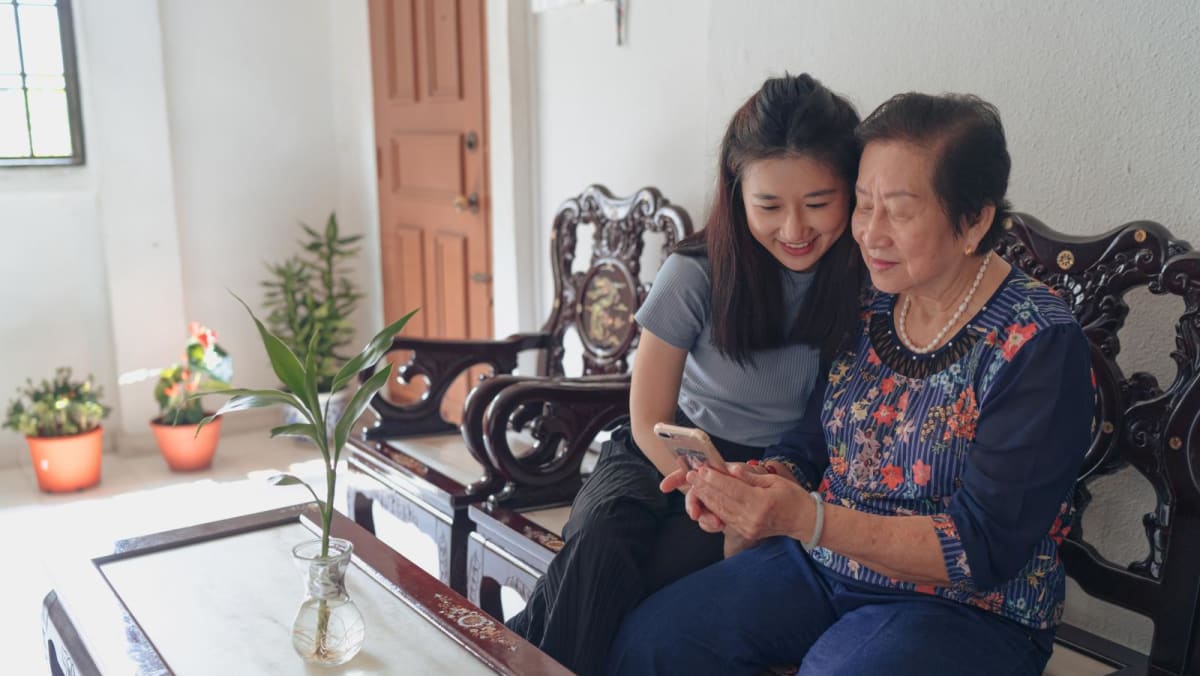
Elaborating on the five competencies, Mr Tan said setting up and using smart devices entails knowing how to operate “the basic functions” in devices.
Acknowledging that the internet grants access to “limitless information and new opportunities”, the second competency on exploring information online underscores the need to know “how to search, view and retrieve this information safely for our use”, he added.
Meanwhile, communicating online covers interacting and connecting with others.
Transacting online for greater convenience touches on access to banking and government services, as well as other goods and service providers, such as booking healthcare appointments.
Being safe, smart and kind online is about “understanding how to keep ourselves safe from scams and false information, and how to build a positive presence online”, added Mr Tan.
“These are all practical skills that can make a real difference to Singaporeans’ day-to-day lives.”
DIGITAL RESOURCES AVAILABLE FROM JANUARY
IMDA has also collaborated with partners under the Digital for Life movement to develop resources in line with the framework, noted Mr Tan.
Interested learners can approach any of the SG Digital community hubs in person, where ambassadors will “walk alongside less-digitally savvy Singaporeans on their journeys”.
Learners can also learn at their own pace by accessing videos and guidebooks on the Digital for Life portal. These resources allow them to teach and help their family and friends pick up digital skills.
Digital resources in English will be rolled out progressively from this month, while resources in Mandarin, Malay and Tamil will be available by the first half of this year, said Mr Tan.
“It is all up to us to keep our digital streets safe,” he concluded, drawing a similarity between conduct in the physical and online space. “Each one of us can play our part to build a safer, more inclusive and kinder digital society.”
7,000 addicts to enter new rehab scheme
Drug users who are mentally ill will be admitted to two-stage care programme
PUBLISHED : 10 Jan 2024 at 18:02

More than 7,000 addicts with mental conditions caused by illicit drug use have been identified and will be brought into a rehabilitation and stabilisation programme, according to the Office of the Narcotics Control Board (ONCB).
A survey was conducted to determine the number of people needing help, said Pol Lt Gen Phanurat Lakboon, the acting secretary-general of the ONCB.
Those identified in the survey will be admitted for treatment and into rehabilitation facilities, known in Thai as Rakjai centres, before they are referred to mental health institutions, he said on Wednesday.
The Rakjai facilities, located in Nakhon Ratchasima, Prachin Buri, Ubon Ratchathani and Kanchanaburi provinces, are jointly operated by the ONCB, the Ministry of Public Health and military personnel who have been trained to work there.
Pol Lt Gen Phanurat said a stabilisation programme will also be provided for those who have been treated but require continued medical care and support so they can focus on their recovery without triggering factors.
It is designed for those whose families or communities are not ready or equipped to provide them with the degree of care they need.
He said the military would discuss where the facilities for the stabilisation programme would be set up. Initially they have been planned in Khon Kaen, Ubon Ratchathani, Udon Thani, Nakhon Ratchasima and Nakhon Phanom.
The military will provide staff while the Ministry of Public Health will provide training and make sure the facilities meet the required standards, he said after a meeting with representatives of the ministry and the police.
The ONCB will also hold discussions with the Interior, Labour and Social Security and Human Development ministries about occupational training to prepare those being treated for reintegration into society.
Defence Minister Sutin Klungsang said those who are admitted to the Rakjai centres will be there on a voluntary basis, and they will be provided occupational training.
Unused navy land being transferred to poor next month
PUBLISHED : 10 Jan 2024 at 17:46

Some state land currently used by the military is being transferred to the poor, starting with 3,918 rai of navy land next month, Defence Minister Sutin Klungsang said on Wednesday.
He was speaking while visiting a navy unit in Phra Samut Chedi district of Samut Prakan. following up on progress in policy implementation.
Mr Sutin said the Pheu Thai Party had promised voters during past election campaigns that it would find land for the poor, so they could make a living.
This policy was being implemented by transferring to the poor degraded forest land and unused state land currently allocated to the military, the minister said. The military land actually belonged to the Treasury Department.
Poor people would be given the land-use rights and become tenants of the Treasury Department, Mr Sutin said. They would be able to transfer these rights to their descendants in perpetuity, the defence minister said. He promised to keep the rent low.
The navy was the quickest of the armed forces to respond to the policy, Mr Sutin said. It would hand back its rights to 3,918 rai of land in Phra Samut Chedi district next month, the minister said.
Penangâs residents, businesses air complaints over 4-day water shutdown, posing test for its embattled chief minister
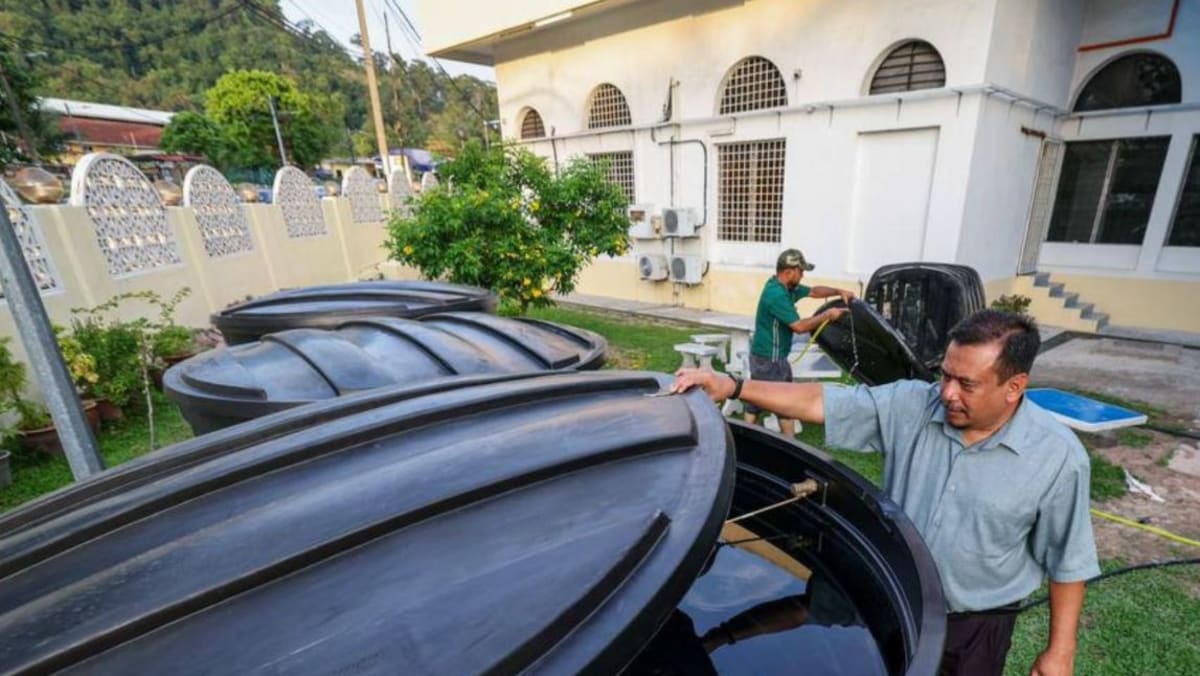
EFFORTS TO STORE AND SAVE WATER
In the days leading up to the water shutdown, Penangites shared images of water-filled containers on social media.
“As a resident affected by this water disruption, I have … (stored) as much water as I can within the limited space of my single-storey terrace house,” said a netizen when asked by CNA on the measures that they are taking to ensure a sufficient supply of water.
Meanwhile, Mr Joel, who lives in George Town, told CNA that he has taken to storing tap water and stocking up on drinking water.
“We will (also) be eating out more at eateries which are open … and (will) pile up our dirty laundries for later,” said the 50-year-old teacher.
A representative from local cafe Halzan noted that many affected people will likely choose to dine out to conserve water.
“We see this as a business opportunity as a lot of households might choose to dine in or take away food, rather than cook at home,” they said.
The cafe operates under a hotel and the representative estimates the hotel’s water storage can sustain the cafe’s business operations for up to two days.
“We have also set aside some water for personal use and (hope that it will be) sufficient to help us get through this period,” they added. “Worse comes to worst, we will serve (our food and drinks) using paper plates and paper cups to reduce the water consumption.”
Some businesses and schools have also instructed their workers and students not to come in during the water shutdown.
Ms Angela – a 37-year-old marketing executive who resides in Penang – told CNA that while her housing estate will not be affected by the water shutdown, her and her husband’s workplaces, as well as their children’s schools, are in the affected areas.
“We have been asked to work and study from home but I am glad that this decision was made as I would prefer the kids to be home … as (our home) isn’t affected by the water shutdown,” she said.
PRESSURE ON PIPES AND PENANG’S CHIEF MINISTER
The chief minister had previously mentioned that the shutdown could be considered a state “emergency situation.” However, he stated that as the pipes were at constant risk of rupture due to high water pressure he wasn’t prepared to avoid action.
“I could have closed my eyes and left it to a future candidate for chief minister to resolve the problem,” Mr Chow said to Free Malaysia Today. “But as leader of the state government and chairman of the Penang Water Supply Company (PBAPP), it is necessary for me to do this to prevent more severe losses for the people.”

